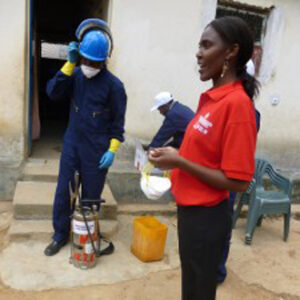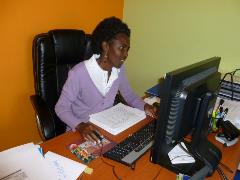
Jorgina K. Jorge coordinated the PMI AIRS Project’s IRS program in Huambo Province in Angola from 2008-2014. Credit: The PMI AIRS Project
“I’d like to see more vulnerable populations in the country reached with malaria prevention activities. I feel that there is still much to be done, especially in basic education of our communities.”
Angola boasts the fastest growing economy in Africa. As this southwest African nation recovers from nearly 30 years of civil war that crippled the country’s infrastructure, its entire population of 22 million remains at risk of contracting malaria. In 2008, the President’s Malaria Initiative (PMI) began supporting Angola’s fight against malaria through indoor residual spraying (IRS) campaigns and entomological monitoring and surveillance. Since being selected as one of the first three PMI focus countries, Angola has made significant progress in malaria control. Data from the 2011 Malaria Indicator Survey show the mortality rate for children under five years of age has fallen by 23 percent in the past five years. One of Angola’s own malaria fighters, Jorgina Kuenda Jorge, has helped bring about those rewards in her role as the project’s Provincial Coordinator in Huambo Province.
PMI AIRS Project: When did you start working in malaria prevention?
In the field of malaria prevention I worked for eight years in building the capacity of nurses from health facilities on how to manage and handle malaria cases, and how to train community members in preventive health.
Before working with IRS, I managed a community health program with the nongovernmental organization Save the Children. One of the components of that project was malaria prevention. I managed the project’s training and establishment of community health committees in the malaria prevention. These committees were formed by community members who had the task of communicating the importance of malaria prevention in their communities.
PMI AIRS: What surprised you most in your work with The PMI AIRS Project?
JKJ: What surprised me was the role I held to coordinate all program activities and my leadership as provincial coordinator at all levels of IRS. In addition, this program has had success thanks to team work, programmatic planning and advance logistics.

PMI AIRS: What kind of impact have you seen from the Project?
JKJ: The Project’s indoor residual spraying in communities had visible results, mainly in the reduction of malaria cases and deaths in Huambo Province. The Project has had great impact, as it provides the information that governments and other stakeholders need to ensure that IRS is efficient and effective. Reliable data combined with a greater program capacity to implement IRS helped in reducing the incidence of malaria in Huambo. I’d like to see more vulnerable populations in the country reached with malaria prevention activities. I feel that there is still much to be done, especially in basic education of our communities.
PMI AIRS: As the Project now focuses solely on entomological monitoring, what kind of impact have you seen from the Project?
JKJ: The entomological monitoring is a building system for the direction and definition of strategies and interventions in decision-making for vector control measures, including spraying. In this post spraying phase in Huambo Province, the presence of an insectary will help us to have live mosquitoes that we can use to monitor the quality of spraying and determine how long the insecticide used remains effective. Entomological data enables us to periodically compare provincial malaria data for making programmatic decisions.
With the Project’s shift from IRS to entomological monitoring, Jorgina continues her fight against malaria as a Program Manager for Mentor Initiative, a nonprofit organization that works to reduce deaths and suffering from malaria and other vector borne diseases in humanitarian crises. PMI provides support to Mentor Initiative in Angola.
This story was taken from www.africairs.net.
